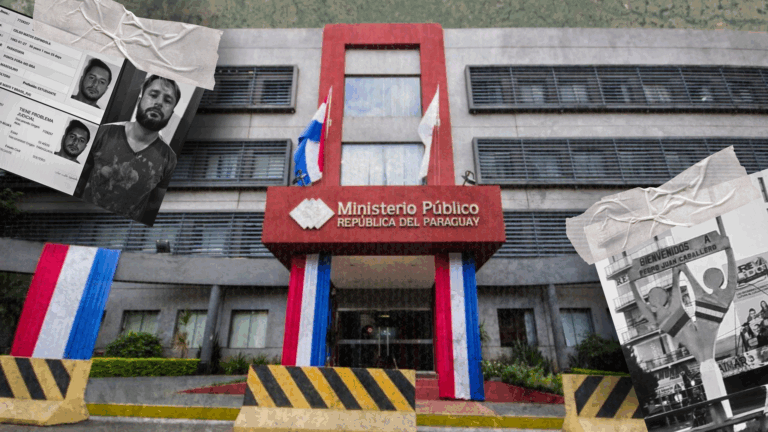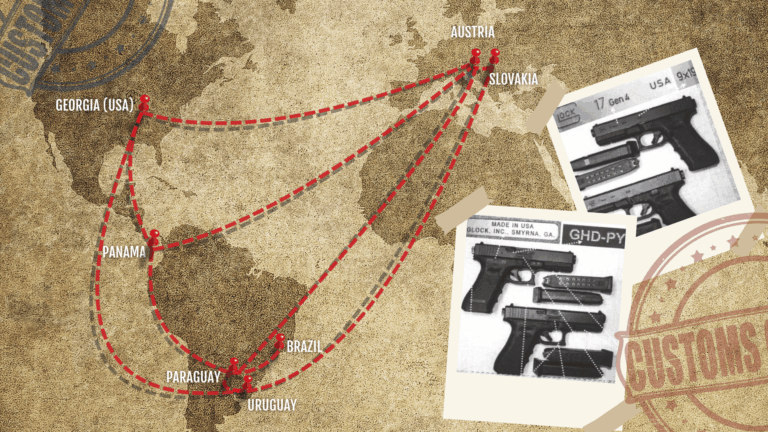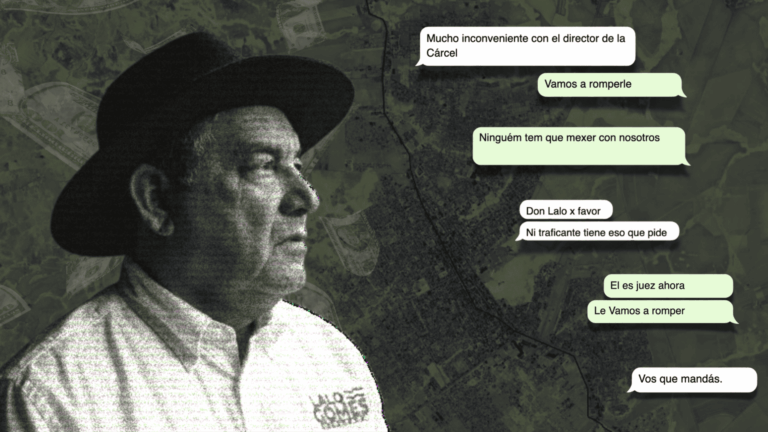- Reading time : 10 min.
Torture In Azerbaijan: How European funds flow to Baku’s Prisons
Since November 2023, six journalists and members of Abzas Media have been arrested in Azerbaijan for allegedly smuggling foreign currency. Previously targeted by the authorities, Abzas Media had recently been reporting on torture against detainees in Azerbaijan’s prisons, which benefit from European funding.
By Laurent Richard and Mariana Abreu
February 1, 2024
Translated by Mariana Abreu.
Additional reporting: Youssr Youssef (Forbidden Stories) and Leyla Mustafayeva (for Forbidden Stories), Roméo Langlois and Karina Chabour (France 24), Daniel Vallot (RFI), Lucas Brouwers and Wilmer Heck (NRC)
On November 20th, 2023, Sevinc Vaqifqizi, a 34-year-old journalist with Abzas Media, a digital investigative media outlet, recorded a video for social media from the Istanbul airport. Hours earlier, Vaqifqizi’s colleague, Ulvi Hasanli, the 36-year-old director of Abzas Media, had been arrested in Baku, Azerbaijan’s capital, when police stormed his home.
As Vaqifqizi prepared to board her flight back to Baku, she had little doubt she would share the same fate as her friend. Still, she took the risk, and through her smartphone, highlighted the ongoing and unprecedented crackdown on Azerbaijani media. “We would like to inform you that the order for Ulvi’s arrest comes directly from President Ilham Aliyev, she said.
She used her last moments of freedom to send a message to the Azerbaijan regime: “People will pick up where we left off even if they arrest Ulvi, or me, or any of us. Don’t let them think they can stop these investigations by arresting us, it won’t happen,” she said in the video. “I can’t just leave Ulvi inside and lead a comfortable life,” she continued.
Upon her arrival in Baku, at Heydar Aliyev Airport–named after the late leader of the former Soviet Republic and father of current president Ilham Aliyev–authorities apprehended Vaqifqizi and detained her.
According to law enforcement, 40,000 euros in cash was allegedly seized at the newspaper’s headquarters in central Baku. Before his arrest, Hasanli had briefly confided in reporters that he believed the money was planted by officials as supposed evidence to charge him with smuggling foreign currency.
According to what Vaqifqizi recounted, Hasanli was allegedly beaten and assaulted upon his arrest. “Why do you cover corruption instead of our victory in Nagorno Karabakh,” authorities allegedly asked Hasanli, referring to the disputed territory between Armenia and Azerbaijan. “Don’t you have better stories to tell?”
Four other journalists and regular collaborators with Abzas Media–Mahammad Kekalov, Nargiz Absalamova, Elnara Gasimova, and Hafiz Babali–were imprisoned over the last few weeks. In the wake of this mounting and unprecedented media crackdown, President Aliyev ordered a snap presidential election for February 7th, eight months earlier than originally scheduled.
Questioned by Forbidden Storiesand its partners at the Plenary Assembly of the Council of Europe on January 22nd, 2023, the representatives of the Azerbaijan delegation denied the existence of political prisoners in Azerbaijan, including Abzas Media journalists. “Maybe you have [political prisoners], but we don’t,” Samad Seyidov, a member of parliament said.“We have persons who violated the rules, and we are fighting for the rule of law,” Seyidov said.
Azerbaijan, a Caucasus country overlooking the Caspian Sea, ranks 151 of 180 on Reporters Without Borders’ Media Freedom Index. In a country ubiquitous with persecuted journalists and political prisoners, Abzas Media is among the rare few tackling the corruption of high-ranking officials and the hidden assets of President Aliyev’s entourage. This work earned Hasanli a spot on the extensive list of journalists targeted by the Pegasus spyware, as revealed by Forbidden Stories and its partners in July 2021.
Forbidden Stories met with Sevinc Vaqifqizi and her colleagues on several occasions in the past, including in 2023 at the Global Investigative Journalism Conference, in Sweden. On her way to Baku, in November, Vaqifqizi also contacted Forbidden Stories. In her messages, she said, “we believe [Hasanli’s arrest] is directly related to our investigations.” Upon their arrests, Vaqifqizi and other Abzas Media journalists requested other journalists pursue their investigations.
Support us so that we can continue investigating
We need your help to expose what the enemies of the press try to keep quiet.
In 2001, Azerbaijan became a member of the Council of Europe–an international organization dedicated to upholding human rights, democracy, and the rule of law in Europe. Since then, the European Court of Human Rights, the Council of Europe’s court, found Azerbaijan violated the European Convention of Human Rights or its protocols 263 times. 33 of these breaches included charges of “torture” or “inhumane and degrading treatment.” In its 2017 report, the Committee for the Prevention of Torture (CPT) reported numerous instances of ill-treatment in prisons, upon visiting several of them, including “slaps, punches, kicks, truncheon blows, blows inflicted with a wooden stick, a chair leg, a baseball bat, a plastic bottle filled with water or with a thick book.” CPT also listed more severe forms of torture, such as “truncheon blows on the soles of the feet (often while the person was suspended) and electric shocks.”
The Baku Connection project, a consortium of 12 media partners created to continue the work of Abzas Media, collaborated with Forbidden Stories to investigate the practice of torture, among other violations, and financing of Azerbaijan’s carceral system–a thread that directs us to the heart of European institutions.
Journalists from the consortium brought together by Forbidden Stories for “The Baku Connection” project. Credit: VPRO Tegenlicht / Erik van Empel
“They tied my arms to the ceiling”
For 30 years, the human rights defenders Arif and Leyla Yunus, have documented the wrongdoing of the Aliyev clan, commonly referred to as “the Corleones” in a diplomatic cable from the US State Department released by Wikileaks. They became the face of resistance against the Azerbaijani regime. On July 30th, 2014, they were arrested and charged with treason, then sentenced to up to eight years in prison before fleeing the country.
Arif, now 69 years old, and his wife, Leyla, live in an undisclosed location in The Netherlands. Leyla, 68, weighed down by illness and the long months spent in prison, wears her Légion d’Honneur proudly as she welcomed Forbidden Stories into her sun-drenched home. From exile, the Yunuses continue to receive and document reports of human rights violations in Azerbaijan. “Sometimes calls are made directly from the cells,” Arif says.
Though it has been several years since he was released from prison and fled Azerbaijan, Arif still bears the psychological scars from his time spent underground, where he was tortured for two months. “They tied my arms to the ceiling, but this time my feet couldn’t reach the floor. It was very painful. My arms were so numb that they no longer obeyed my commands. My left hand was particularly sore where the handcuff pressed on the tendon,” Arif wrote in a 2024 book in which he recounted his experience in prison. “I wanted to scream out in pain, but I didn’t have enough air.” He recalls being asked repeatedly, “Now, are you going to tell us about your visits and your criminal links with the Armenians?” “I didn’t have the strength to speak. I shook my head with difficulty in refusal,” he said.
During our visit with the Yunuses, we presented them with our findings. Aside from the 23 million euros transferred from the Council of Europe to Azerbaijan, one project drew our attention. The European Union and the Council of Europe co-financed a project called SPERA, a 1.3 million euro initiative focused on reforming Azerbaijan’s penitentiary system. The program included Zoom meetings to discuss “organizational security,” workshops to “coach” Azerbaijani prison guards, and a “case study” visit to a prison in Spain.
Protect your stories
Are you a journalist under threat because of your reporting? Secure your information with Forbidden Stories.
Arif Yunus, historian and human rights activist, shows Forbidden Stories the plan of the prison in which he says he was tortured, and which he drew and published in a book he co-wrote with his wife: The Price of Freedom. Credit: VPRO Tegenlicht / Erik van Empel
When presented with a screenshot of the last Zoom meeting held on October 28th, 2021, the Yunuses appear shocked. They instantly recognize Iftikhar Qurbanov, a doctor taking part in the SPERA program, who they claim is connected to special services. “He personally intimidated me and Leyla,” Arif said.
Elnur Abbasli, one of the people overseeing prison 16, is also pictured. The Yunuses say bartering is commonly practised in prison 16, and higher-ups sign off.
Also invited to take part in the work to improve Azerbaijan’s penitentiary system is the director of a “GONGO” or governmental NGO, the acronym widely used in Azerbaijan to designate pseudo-nonprofits controlled by the state. The director’s name appears on a list of 640 NGOs that congratulated President Ilham Aliyev on November 9, 2020 for the signing of the ceasefire agreement between Azerbaijan and Armenia. “Dear Commander in Chief, I warmly congratulate you on the historic victory day of November 8… We are proud of you and wish you success in your historic mission of freedom,” the text reads. The Council of Europe confirmed in an e-mail to Forbidden Stories that it provided funds to the NGOs participating in the SPERA 2 program.
“It’s just a front. They just do seminars”
“This allows Azerbaijan to say it’s working with Europe, and European bureaucrats take notes. Afterwards, everyone congratulates each other and goes to a restaurant to celebrate. Azerbaijan can say that it has laid off a certain number of people, or that it has convicted some sixty people in a case… But the system remains the same, and it works on both sides. In the end, it’s good for both sides,” Mammadov said.
In its progress report, the Council of Europe specifies that in Azerbaijan, “a number of offences were decriminalised, alternative punishment was introduced, as were non-custodial measures of restraint.” The Council also noted the “reduction in number and length of pre-trial detentions,” and the April 2019 “Presidential Decree,” which allegedly introduced judicial and legal system reforms. But to human rights experts in the country, it is all for show. “It doesn’t matter what kind of regulations are passed, especially when it’s related to political prisons,” Yalchin Imanov, an Azerbaijani lawyer, said.
“You know, it’s like the buildings in Azerbaijan. The façades have been repainted, but when you go around them and look at the building from behind, they’re still old and degraded Soviet-style buildings. It’s the same with law,” he said.
The Council of Europe progress report highlighted training “85 new candidate lawyers” to “increase their awareness on Council of Europe standards.” As for Yalchin Imanov, he was disbarred in 2017, after filing a complaint for the torture of one of his clients.
“It goes without saying that we can’t force them to work in a certain way,” a Council of Europe official said embarrassingly. “Both are invited to put a little water in their wine.”
Some 20 parliamentarians from the Council of Europe sounded the alarm in June 2019, when they signed a motion for resolution stating that “The funds from the Council of Europe and the European Union are used by the GONGOs and government agencies for projects and programs that do nothing to help the Azerbaijani civil society or its people.”
Cypriot Constantinos Estafios, a member of the parliamentary assembly, said, “this is the failure of the Council of Europe. 70 years after its creation, which was based on legal order, democracy and respect for human rights, we are still discussing fundamental and elementary situations.”
When contacted by Forbidden Stories, the Council of Europe’s press office gave no further details on the evaluation procedures for programs financed in Azerbaijan. As for the risk of using bogus NGOs, the Secretary General’s office said it works with NGOs selected on the “basis of a public and transparent tendering procedure.”
Let’s keep in touch!
TRIGGER WARNING – The following section contains graphic images of torture
“You have to understand that one day you will be arrested”
Photo of Tofig Yagublu, Azerbaijan’s well-known opposition figure, after his arrest by police forces in December 2021. He was arrested again in December 2023, at the same time as members of Abzas Media and other journalists and government critics. Credit: All Rights Reserved
The same allegedly reformed penitentiary and judicial system, previously called out in Abzas Media’ reporting, is the same system now holding them behind bars and has now frozen their bank accounts.
According to Djordje Alempijević, a former member of the CPT who visited Azerbaijan on 3 occasions, the practice of torture inside Azerbaijan’s prisons is “endemic and resistant.” “Our findings have not convinced us that progress has been made in resolving the problem.”
Records of visits to Azerbaijan by the CPT can only be found until 2018, despite two visits in 2020 and 2022. The Committee, which depends on the Council of Europe, cannot make its reports public without Azerbaijan’s consent. “The authorities don’t like the content of our reports… they don’t want these facts to be made public,” Alempijević said, somewhat embarrassed.
An ally for the autocrats
Gerald Knaus, President of the European Stability Initiative, said such policies indicate that the Council of Europe “is becoming an ally of autocrats.” “Being silent, being cowardly, not speaking out, not saying that white is white and black is black, is incredibly useful to autocrats,” the head of the Berlin-based think tank that investigated Caviar Diplomacy says.
When asked about the possible suspension of the Azerbaijani delegation from the Parliamentary Assembly of the Council of Europe (PACE), Dunja Mijatović, Commissioner for Human Rights, claims, “That has nothing to do with me, that is a PACE issue.” On the question of torture, Mijatović said, “that’s the CPT, that’s clear.” On the funds transferred to Baku from the Council of Europe, she said, “Oh, that’s the Secretary General.” Only when the issue of press freedom arose, were we advised to “send an email,” in response to which we were denied an interview.
Baku’s strong connection to Europe, some point out, might be related to the quantity of gas flowing between Azerbaijan and the EU. Following the suspension of gas exports from Russia, in 2022, Ursula von der Leyen, President of the European Commission, signed a supply contract with Ilham Aliyev for at least 20 billion cubic meters per year.
From the presidential palace gardens, von der Leyen praised a “trustworthy and reliable partner,” referring to Aliyev. “It would be an understatement to say that this announcement comes as a shock to anyone familiar with the way in which the dictatorship ruling Azerbaijan uses the proceeds of its gas revenues,” reads a tribune signed by some fifty elected representatives in the French newspaper Le Monde.
Ilham Aliyev and European Commission President Ursula von der Leyen at the ceremony for the signing of an agreement to double gas imports from Azerbaijan, on July 18, 2022. Credit: Handout / Azerbaijani presidency / AFP
Contacted by Forbidden Stories, Peter Stano, spokesman for the President of the European Commission, insisted by phone. Ilham Aliyev is reliable. “The President of the commission said this in relation to the Memorandum of Understanding on Energy,” Stano said.
Stano said the European Commission calls for the release of “those imprisoned for exercising their fundamental rights,” including journalists, but said there is validity in European-funded programs in Azerbaijan. “The logic of this engagement, of the projects in this area, is also to raise awareness, to compare standards, to tell them ‘look, you can do things differently.’ You need to start somewhere. This is a country that emerged from 70 years of a communist totalitarian regime. And they are still in a semi-autocratic regime. If you want to change it, you can either ignore them or engage with them,” Stano said.
At the Council of Europe, many have been increasingly critical of Azerbaijan following its military intervention in Nagorno-Karabakh, which forced over 100,000 Armenians to flee the region. On January 24th, the PACE voted (76 to 10) to revoke Azerbaijan’s credentials for failing to comply with its obligations as a member state. Azerbaijan, whose membership has not yet been challenged, pre-emptively left the Parliamentary Assembly, denouncing the “current unbearable atmosphere of racism, Azerbaijanophobia and Islamophobia within PACE.”
Contacted by Forbidden Stories and its partners, the Presidency of the Republic of Azerbaijan declined to answer our questions.
Just a few days before the Presidential elections, Abzas Media’s website is no longer accessible in Baku. Hasanli’s last written words are dated December 30th, 2023. In a note he wrote from his prison cell, which has since been made public, he wrote, “ou probably know that we–Sevinj Vaqifqizi, Nargiz Absalamova, Hafiz Babali, Mahammad Kekalov, and myself–are completely isolated. No telephone conversations or meetings with our families are allowed. We are not even allowed to call our lawyers, the ombudsman, nor write letters to our loved ones. Members of the government should understand that it is impossible to completely prevent criticism and freedom of expression,” he wrote. To sign off, Hasanli borrowed Einstein’s words: “Truth is subtle, but it is not malicious.”
À lire aussi













